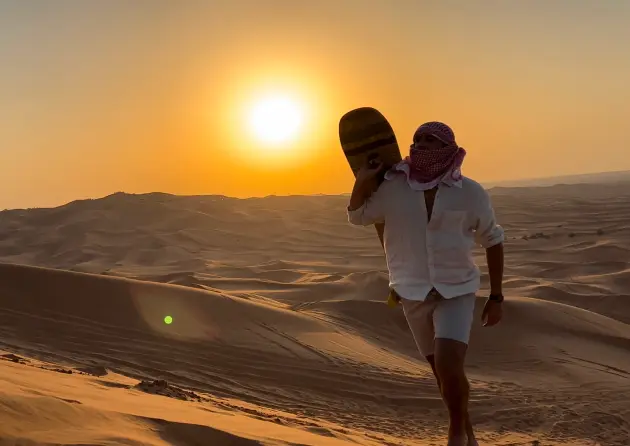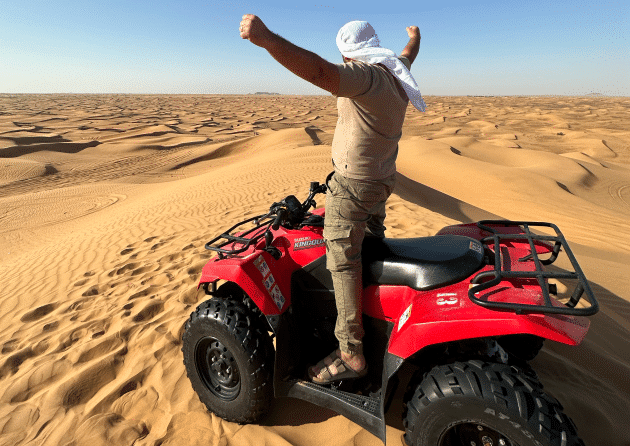When visiting Dubai and the United Arab Emirates, learning a few Arabic greetings can significantly enhance your travel experience. Not only does it show respect for the local culture, but it also helps break the ice with locals who genuinely appreciate tourists making an effort to speak their language. This small gesture can make your evening at a bedouin camp even more memorable, especially as you enjoy traditional activities like the mesmerizing Tanoura dance under the desert stars. This guide will walk you through the essential Arabic greetings and phrases that will make your Dubai adventure more immersive and authentic.
Why Learn Arabic Greetings for Your Dubai Trip?
Before diving into the phrases, let’s understand why learning how to greet in Arabic is valuable when visiting Dubai for a desert safari Dubai experience:
- Shows respect: Using Arabic greetings demonstrates respect for Emirati culture and traditions
- Creates connections: Even basic Arabic phrases can help forge meaningful connections with locals
- Enhances experiences: Speaking a few words of Arabic can lead to more authentic interactions and experiences
- Practical benefits: You might get better service, friendlier responses, and occasionally even better prices
- Cultural immersion: It’s a gateway to understanding the rich cultural heritage of Dubai and the UAE
Essential Arabic Greetings and Phrases

Basic Greetings
1. “As-salamu alaykum” (السلام عليكم)
- Pronunciation: ah-sah-LAM-u ah-LAY-koom
- Meaning: “Peace be upon you”
- Usage: This is the most common greeting in the Arabic-speaking world and is suitable in virtually all situations. It’s respectful, formal, and appropriate for greeting anyone, regardless of their age, gender, or social status.
- Response: If someone greets you with this phrase, respond with “Wa alaykumu s-salam” (وعليكم السلام), which means “And peace be upon you too.”
2. “Marhaba” (مرحبا)
- Pronunciation: MAR-ha-ba
- Meaning: “Hello” or “Welcome”
- Usage: A casual, friendly greeting that’s perfect for informal situations. It’s lighter than “As-salamu alaykum” and widely used in Dubai, especially in tourism contexts.
- Response: You can simply reply with “Marhaba” as well.
3. “Ahlan” (أهلاً) or “Ahlan wa sahlan” (أهلاً وسهلاً)
- Pronunciation: AH-lan or AH-lan wa SAH-lan
- Meaning: “Welcome” or “Hello” (the extended version literally means “Welcome and make yourself at ease”)
- Usage: Another warm greeting that’s common in Dubai. You’ll often hear this when entering shops, restaurants, or hotels.
- Response: “Ahlan bik” (for men) or “Ahlan biki” (for women), meaning “Welcome to you.”
Time-Specific Greetings
4. “Sabah al-khayr” (صباح الخير)
- Pronunciation: sa-BAH al-KHA-yir
- Meaning: “Good morning”
- Usage: Used in the morning hours until around noon.
- Response: “Sabah an-noor” (صباح النور), which literally means “Morning of light.”
5. “Masa al-khayr” (مساء الخير)
- Pronunciation: ma-SAA al-KHA-yir
- Meaning: “Good evening/afternoon”
- Usage: Used from the afternoon onwards.
- Response: “Masa an-noor” (مساء النور), meaning “Evening of light.”
Asking About Wellbeing
6. “Kaif halak?” (كيف حالك؟) (for men) or “Kaif halik?” (كيف حالك؟) (for women)
- Pronunciation: KAY-f HA-lak or KAY-f HA-lik
- Meaning: “How are you?”
- Usage: Asked after the initial greeting to inquire about someone’s wellbeing.
- Response: “Ana bekhair, shukran” (أنا بخير، شكراً), meaning “I am fine, thank you.”
7. “Shu akhbarak?” (شو أخبارك؟)
- Pronunciation: shoo akh-BA-rak
- Meaning: “What’s your news?” or “What’s up?”
- Usage: A more casual way to ask how someone is doing, especially popular in Gulf Arabic.
- Response: “Kull shi tamam” (كل شي تمام), meaning “Everything is good.”
Introducing Yourself
8. “Ana ismi…” (أنا اسمي…)
- Pronunciation: A-na IS-mi…
- Meaning: “My name is…”
- Usage: Use this phrase followed by your name when introducing yourself.
9. “Tasharrafna” (تشرفنا)
- Pronunciation: ta-sha-RAF-na
- Meaning: “Pleased to meet you”
- Usage: Say this after someone introduces themselves to you.
Expressing Gratitude
10. “Shukran” (شكراً)
- Pronunciation: SHUK-ran
- Meaning: “Thank you”
- Usage: Used to express gratitude in any situation.
- Response: “Afwan” (عفواً), meaning “You’re welcome.”
11. “Shukran jazilan” (شكراً جزيلاً)
- Pronunciation: SHUK-ran ja-ZEE-lan
- Meaning: “Thank you very much”
- Usage: For expressing deeper gratitude.
Polite Phrases
12. “Min fadlak” (من فضلك) (for men) or “Min fadlik” (من فضلك) (for women)
- Pronunciation: min FAD-lak or min FAD-lik
- Meaning: “Please”
- Usage: Used when making a request or asking for something.
13. “Afwan” (عفواً)
- Pronunciation: AF-wan
- Meaning: “Excuse me” or “You’re welcome”
- Usage: Used both to get someone’s attention politely and to respond to “thank you.”
Saying Goodbye
14. “Ma’a salama” (مع السلامة)
- Pronunciation: MA-ah sa-LA-ma
- Meaning: “Goodbye” (literally: “with safety”)
- Usage: A common way to say goodbye.
- Response: “Allah yisallmak” (الله يسلمك), meaning “May God keep you safe.”
15. “Ilal liqa” (إلى اللقاء)
- Pronunciation: ee-lal li-QAA
- Meaning: “Until we meet again”
- Usage: A more formal way to say goodbye.
Cultural Tips for Using Arabic Greetings in Dubai
Greeting Etiquette
- Hand on heart: After shaking hands or instead of shaking hands, placing your right hand over your heart is a gesture of respect and sincerity.
- Gender considerations: In more traditional settings, wait for a woman to extend her hand before offering yours. If she doesn’t, simply nod and place your hand over your heart.
- Patience with greetings: Don’t rush through greetings. In Arabic culture, greeting exchanges can be longer than what Western visitors might be accustomed to.
Regional Variations
Dubai’s diverse population means you’ll hear many dialects of Arabic. The local Emirati dialect has some unique characteristics:
- The letter “k” (ك) in Classical Arabic often becomes “ch” in Emirati dialect. For example, “Kaif halak” might be pronounced more like “Chaif halach.”
- You’ll also hear many Levantine (Lebanese, Syrian) pronunciations due to the large expat population from these countries.
Common Greeting Scenarios in Dubai
In a Desert Safari
When joining our evening desert safari experiences, greeting your Bedouin guide with “As-salamu alaykum” or “Marhaba” sets a positive tone for your adventure. If they offer Arabic coffee (gahwa), accepting it is considered polite. Say “Shukran” when receiving it.
At a Traditional Souk
When entering shops in places like the Gold Souk or Spice Souk, a friendly “Marhaba” or “As-salamu alaykum” can often lead to a warmer shopping experience. Shopkeepers appreciate tourists who make an effort to speak a few words of Arabic.
In Restaurants
Greet restaurant staff with “Marhaba” or “As-salamu alaykum.” If you enjoy your meal, expressing your appreciation with “Akl laziz” (أكل لذيذ – delicious food) will bring smiles all around.
In Hotels and Luxury Establishments
Staff in Dubai’s luxury establishments are typically trained to greet guests in multiple languages. Responding to their Arabic greetings with the appropriate response shows cultural awareness and is always appreciated.
Pronunciation Tips for Arabic Learners
Arabic phonetics can be challenging for English speakers. Here are some tips:
- The letter “kh” (خ) is pronounced like the “ch” in the Scottish “loch” or German “Bach” – a guttural sound made at the back of the throat
- The letter “q” (ق) is a deep “k” sound made at the back of the throat
- The letter “r” (ر) is slightly rolled
- The letter “gh” (غ) is similar to the French “r” – a gargled sound
- Emphasis on syllables is important in Arabic – we’ve capitalized the stressed syllables in our pronunciation guide





